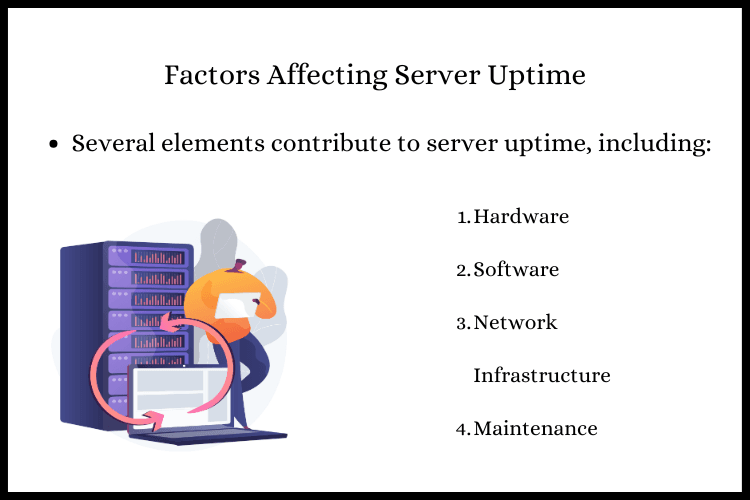Table of Contents
Introduction
In today’s digital age, a website’s success hinges on its performance and reliability. Server uptime, or the proportion of time a server is up and running, is the foundation of this reliability. User experience, SEO rankings, and company profitability are all greatly impacted by server uptime.. At Serverstack, we prioritize uptime by leveraging advanced hardware like Intel Xeon processors and robust data storage solutions to ensure your website runs seamlessly.
What is Server Uptime?
Server uptime refers to the amount of time a server remains functional and accessible. It is typically expressed as a percentage, such as “99.9% uptime,” meaning the server is operational nearly all the time except for a few planned or unplanned interruptions. A high uptime promotes dependability and confidence by ensuring that users can access a website whenever they need to.
Why Server Uptime Matters ?
1. User Experience
A website that’s frequently down or slow frustrates users, leading to higher bounce rates and lost opportunities. High uptime ensures smooth navigation and consistent accessibility.
Contact us
2. SEO Rankings
Search engines like Google prioritize websites that deliver a reliable user experience. Downtime can hurt your SEO rankings, making your site harder to find.
3. Revenue Impact
For e-commerce websites, every minute of downtime translates to lost sales. Reliable uptime protects your bottom line by keeping your online store open around the clock.

Factors Affecting Server Uptime
Several elements contribute to server uptime, including:
- Hardware: Durable servers, such as those powered by Intel Xeon, provide consistent performance.
- Software: Updated and secure software reduces vulnerabilities that can lead to outages.
- Network Infrastructure: Reliable networks ensure uninterrupted connectivity.
- Maintenance: Proactive server monitoring and regular maintenance prevent unexpected downtime.
The Role of Data Storage in Uptime
Reliable Data Storage is crucial for maintaining uptime. Advanced storage solutions protect your data from loss or corruption, ensuring it is always accessible even during server hiccups.
Intel Xeon and Uptime
Intel Xeon processors, featured in Intel servers, are highly regarded for their reliability, speed, and ability to manage demanding workloads. Their efficiency reduces downtime risks, making them the preferred choice for hosting providers like Serverstack.
Impacts of Poor Uptime
When uptime falters, the consequences can be severe:
- Frustrated Users: Users expect websites to load instantly. Downtime damages their trust.
- Lost Revenue: Every second of downtime can result in significant revenue loss, particularly for online businesses.
- Reputation Damage: Frequent outages tarnish a company’s reputation, discouraging potential customers.

Benefits of High Uptime
- Enhanced User Trust: Consistent uptime builds confidence in your brand.
- SEO Boost: Search engines reward reliable websites with higher rankings.
- Increased Conversions: On trustworthy websites, users are more likely to complete actions.
How Serverstack Ensures High Uptime
At Serverstack, we use cutting-edge technology to maintain industry-leading uptime:
- Intel Xeon Processors: Providing unparalleled dependability and performance.
- Data Storage Solutions: Ensuring your critical data is always secure and accessible.
- 24/7 Monitoring: Addressing issues before they affect performance.
- Redundant Infrastructure: Minimizing the risk of downtime.
Monitoring Server Uptime
Real-time monitoring tools, such as uptime trackers, help businesses maintain optimal uptime. These tools provide detailed analytics and alerts, enabling quick responses to potential issues.
Conclusion
Server uptime is a cornerstone of a successful website, influencing user experience, SEO rankings, and business revenue. By choosing reliable hosting providers like Serverstack, which leverages Intel Xeon technology and robust data storage systems, you can guarantee your website remains operational and accessible. Don’t compromise on reliability—trust Serverstack to keep your website running smoothly and your users satisfied.
Frequently Asked Question
1. What is considered good server uptime?
Good uptime is generally above 99.9%, equating to less than an hour of downtime per year.
2. How does uptime affect SEO?
Search engines penalize websites with frequent downtime, reducing their visibility in search results.
3. Why choose Serverstack for uptime solutions?
Serverstack offers advanced Intel Xeon servers, robust data storage, and 24/7 support to ensure consistent uptime.
4. What are the financial impacts of poor uptime?
Poor uptime can lead to lost revenue, reduced conversions, and a tarnished reputation.
5. How can I improve my server uptime?
Invest in reliable hosting, proactive monitoring, regular maintenance, and data backup solutions.
6. Why is data storage important for uptime?
Efficient data storage protects against data loss and ensures website functionality during server disruptions.







